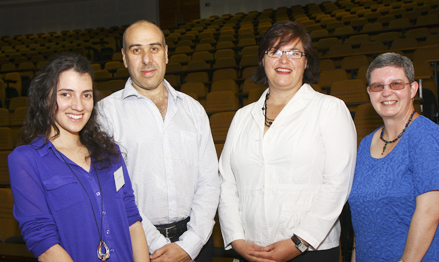Latest News Archive
Please select Category, Year, and then Month to display items
12 October 2020
|
Story Arina Engelbrecht
|
Photo Supplied
 Arina Engelbrecht from Organisational Development and Employee Well-being believes physical activity has a number of benefits for one’s health, including stress relief.
Arina Engelbrecht from Organisational Development and Employee Well-being believes physical activity has a number of benefits for one’s health, including stress relief.
Being physically active plays a big role in preventing the development of mental-health problems and in improving the quality of life of people experiencing mental-health problems.
Treatment for depression
Physical activity can be an alternative treatment for depression. It can be used as a stand-alone treatment or in combination with medication and/or psychological therapy. It promotes all kinds of changes in the brain, including neural growth, reduced inflammation, and new activity patterns are formed that promote feelings of calm and well-being. It releases endorphins – powerful chemicals in the brain that energise your spirit and make you feel good.
Physical activity can be very effective in relieving stress. Research in adults has found that physically active individuals tend to have lower stress levels compared to individuals who are less active. It also leads to improved sleep. When a person sleeps better and feels more rested, overall quality of life improves. They cope better with daily life stressors.
Reduce Alzheimer's risk
Regular physical activity can reduce your risk of developing Alzheimer's disease by up to 50%. It can also slow down further deterioration in those who have already started to develop cognitive problems. It stimulates the brain’s ability to maintain old connections as well as to make new ones.
A study asked people to rate their mood immediately after periods of physical activity (e.g. going for a walk/run, cycling, doing housework) and periods of inactivity (e.g. reading a book or watching television). Researchers found that participants felt more content, more awake, and calmer after being physically active compared to after periods of inactivity.
In conclusion, people who are physically active feel a sense of well-being, feel more energetic throughout the day, sleep better at night, have sharper memories, and feel more relaxed and positive about themselves and their lives.
“Being physically active not only changes your body, it changes your mind,
attitude, and your mood.” – Arina Engelbrecht
Workshop looks at new communities in the Free State and Gauteng
2013-11-08
 |
At the PARI workshop were, from the left: Laura Phillips, researcher at PARI, Prof Ivor Chipkin, CEO of PARI, Prof Corli Witthuhn, Vice-Rector: Research and Dr Tania Coetzee, Senior Lecturer in the Department of Political Studies and Governance.
Photo: Hannes Pieterse
08 November 2013 |
The university, in cooperation with the Public Affairs Research Institute (PARI), recently presented a workshop on new communities in the Free State and Gauteng. A variety of subjects, which explored the anthropology, sociology and history of the two provinces, were debated at the workshop. Discussions were held on the challenges faced by new communities, with the socio-economic and religious aspects of new communities coming under scrutiny. Environmental issues and responsibilities also came under fire and speakers agreed that individuals need to get involved in the community and that they should do something to address the housing and food shortage in South Africa.